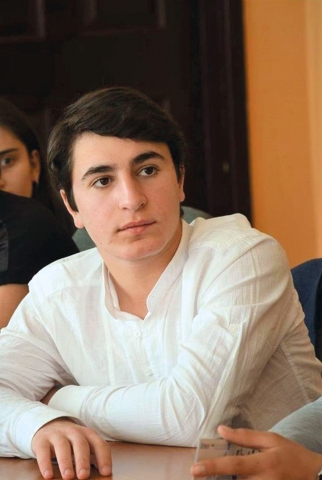USAID-Supported Civics Club Shows How Youth Can Contribute to C-19 Response
The COVID-19 pandemic has shined a light on one of USAID’s guiding principles: for communities and societies to be resilient against threats, whether conflicts, economic crises, or a pandemic, citizens need to step up and take responsibility. USAID’s Momavlis Taoba (‘Future Generation’) activity is a nationwide program that encourages secondary school students to participate in community service. During the COVID-19 pandemic, members of civics clubs have made a difference in communities across the country, including in Kvatsikhe, a village in Chiatura Municipality.
Student-led Group Addresses Community Issues
Public school students formed the Kvatsikhe Civics Club in 2018 as a way to make a positive difference in their community. They named the club ‘Vector’ and set the goal of raising public awareness about important social issues through informational videos, stories, and online training activities. One of the civics club’s first initiatives was creating a Facebook page – ‘Civil Media’ - where students could participate in open discussions and reach out to different groups within the community, both in Chiatura Municipality and in other regions of Georgia.
In the early days, says the club’s leader Ilia Kipshidze, members had to convince their neighbors that these activities were worthwhile: “They [residents of Kvatsikhe] did not believe that students could make any significant changes.”
This changed quickly, due to the efforts of Ilia and his fellow students: “Their attitude changed drastically when they saw the results of the information campaigns we carried out on critical issues for the community.”
Vector has since carried out activities aimed at addressing specific problems, such as cleaning up public areas and promoting a healthy lifestyle.
“The members of our civics club always try to do interesting and important activities for our school and community. While we do these initiatives, we learn a lot of things that are not taught in school,” said Giga Gvaladze, one of the club’s members.
Civics Club Connects Citizens with Answers about COVID-19
When COVID-19 came to Georgia, Vector snapped into action. Seeing that many members of the community lacked accurate public health information, the club’s members began using ‘Civil Media’ to host online information sessions. One of their first initiatives was organizing an online information session with Dr. Giorgi Pkhakadze, a healthcare advisor to the UN Secretary General. Ilia reached out to Dr. Pkhakadze and asked for his help informing the public about measures people can take to prevent COVID-19, effective treatment practices around the world, efforts to develop a vaccine, and more.
Dr. Pkhakadze was happy to help. Originally planned for 40 minutes, the live online session ran for more than two hours. Dr. Pkhakadze responded to questions from students, teachers, and parents all eager to learn more about COVID-19 and how to prevent its spread in Georgia.
Reflecting on the successful activity, Ilia had this to say: “As information [about COVID-19] grows, so do the questions. Through the media or social networks, we constantly hear news about the virus, but we still have some questions and ambiguities that we cannot answer. We [the civics club members] wanted to offer a format for the listener where they would be able to ask questions directly and get comprehensive answers. I have often seen Dr. Pkhakadze on TV and his interesting conversation made me think that he is one of the strongest professionals in the field of healthcare, and that he would be the best speaker for this live engagement. In addition to his professionalism, he always supports interesting initiatives, especially those initiated by young people.”
Ilia and other members of the Kvatsikhe Civics Club have since hosted other online sessions, engaging other professionals and public figures to share insights with students not only from Chiatura Municipality but from across Georgia, as well as sharing knowledge and planning joint initiatives with members of other civics clubs.
Ilia credits USAID and Momavlis Taoba with giving his peers a platform and an opportunity to make a difference: “Momavlis Taoba promotes the development of young people, teaches them to work in a democratic environment, to take on responsibilities ... this contributes to a civically active generation.”
About USAID’s Momavlis Taoba Activity: Momavlis Taoba (‘Future Generation’) supports civic education through three main activities: enhanced teacher training and civic curricula; practical civic education projects; and support for student-led civics clubs. Notably, civics clubs receive small grants enabling them to plan, manage, and implement their own community activities. These activities are designed to institutionalize civic education in Georgia’s school system, providing Georgian society with capacity to ensure that young people have knowledge, skills, and opportunities to engage on important social issues.
Ilia Kipshidze, leader of the Kvatsikhe Civics Club 'Vector'












